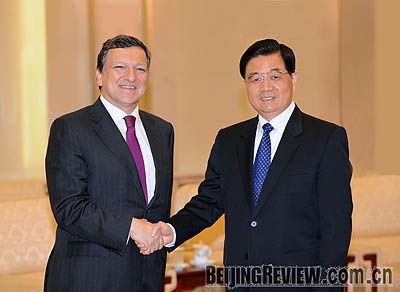|

WELCOME: Chinese President Hu Jintao meets visiting EU Commission President Jose Manuel Barroso at the Great Hall of the People in Beijing on April 25 Photo by MA ZHANCHENG
In May 1975, Sir Christopher Soames, the first European Commissioner to visit China, touched down in Beijing on a mission to lay the foundation for a fledgling Sino-European relationship. Now 33 years later, the current President of European Union Commission Jose Manuel Barroso led a high-ranking delegation of nine commissioners back to the nation's capital to foster an EU strategic partnership with China. The EU described it as the largest joint mission abroad of the European Commission for a single meeting in its 50 years of existence.
Barroso said his three-day visit was an "unprecedented meeting" between the EU and the Chinese Government. From April 24 to 26, the two sides signed agreements and exchanged views on energy-saving projects, renewable energy uses and sustainable development, as well as strengthening political and economic ties. Both the official communiqués and critics' analyses of the meetings showed that the Sino-EU relationship is in a positive place, and cooperation and ambitious interdependence were highly touted.
EU visit
At Chinese Premier Wen Jiabao's invitation, Barroso had organized one third of the EU's total 27 commissioners to China. On Barroso's agenda were issues like climate change, sustainable development, macroeconomic imbalances, international security, financial turmoil, exchange rate fluctuations, energy prices, food prices, raw materials and development in Africa.
President Hu Jintao and Premier Wen met the delegation and exchanged views with Barroso on Sino-EU ties and big global issues.
China's delegation included ministers from 10 ministries who participated in the first session of High-Level Economic and Trade Dialogue Mechanism (HLM), co-chaired by Chinese Vice Premier Wang Qishan and Barroso's personal representative Commissioner Peter Mandelson.
Apart from scientific and technological cooperation, notably in the peaceful use of nuclear energy and cooperation on climate change, environment protection and energy saving, the HLM, which is of vice-premier level, or the highest level of current China-EU trade and economic dialogue mechanism, was one major achievement of the Barroso's Beijing tour.
Although agreements were not signed in specific fields, the two sides reached consensus on making the HLM an annual event. Under the HLM framework, China and the EU can discuss issues in various aspects of trade and economic cooperation. "Compared to existing dialogue mechanisms in this field, the HLM focuses more on fields of strategic, foresighted and blueprinted significance. It will not weaken or replace other dialogue mechanism between China and the EU, but will conduct them," said Sun Yongfu, Director General of Department of European Affairs, Ministry of Commerce.
The Chinese Government and the EU delegation also set agendas for the China-EU summits this year that will be held in France and Beijing. The two sides agreed to develop new strategic cooperation on science and research, with identified areas of energy, climate change, biotechnology and health, and also agreed to sign a Financing Agreement to set up a China-EU Clean Energy Center at this year's China-EU summit in Beijing.
On a people-to-people exchange level, Barroso told a press conference held on April 25, "The EU considers the stability and the prosperity of China is of paramount importance for the international community," vowing that the two sides would increase people-to-people exchanges, particularly among students and young professionals so as to mold a solid foundation to the bilateral relations. He also confirmed that the EU rejected the boycott of the Olympics in Beijing.
China-EU relationship
Chinese experts on international studies were upbeat about Barroso's visit.
"The China-EU relationship is a beneficial one," said Zhao Chen, who is on EU study from the Chinese Academy of Social Sciences (CASS). He noticed that 2003 was the "honeymoon" of bilateral relationship. Although there were small twists and turns in various areas, especially in trade and economic aspects, the overall situation of current bilateral tie remains good, the foundation of the relations is solid, and they have common understanding of building a multilateral world, Zhao told Beijing Review.
In 2007, a new generation of European leaders came into power. Unlike their predecessors' pragmatic approach in dealing with China, some of these new leaders pay more attention to "value-oriented diplomacy," Zhao said. This tendency was related to the changing political, trade and economic situation between the two sides. When China had a trade surplus in bilateral trade, protectionism bloomed in Europe, and the feelings were reflected in the diplomatic field. "As some European countries thought they were losing their advantage in trade competition, they tried to occupy the high moral ground by insisting on value-oriented diplomacy," he said.
| 